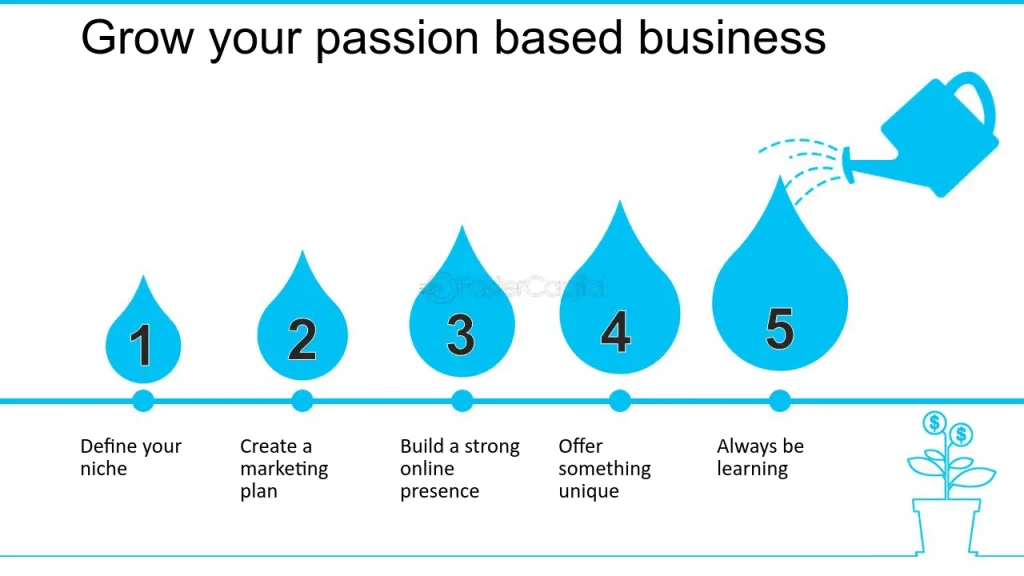Turning your passion into a successful online business is one of the most fulfilling experiences you can have. Not only does it allow you to do what you love, but it also provides the opportunity to earn a living while doing so. However, passion alone is not enough; building a sustainable and profitable business requires planning, strategy, and persistence. In this guide, we’ll walk through actionable steps to transform your passion into a successful online business.
Table of Contents:
- Identifying Your Passion and Its Market Potential
- Validating Your Idea with Market Research
- Defining Your Target Audience
- Choosing the Right Business Model
- Building Your Online Presence
- Creating Valuable Content and Products
- Marketing Your Passion-Based Business
- Monetizing Your Passion
- Scaling Your Business for Long-Term Success

1. Identifying Your Passion and Its Market Potential
A. What’s Your True Passion?
The first step is to clearly identify what you’re passionate about. Passion could stem from a hobby, a skill, or an area of expertise. It’s important that this passion is something you enjoy and can sustain long-term, even during challenging times.
Ask yourself:
- What excites you most in your free time?
- What could you talk about or work on for hours without feeling bored?
- What expertise do you have that others may find valuable?
B. Assessing the Market Potential
While passion is essential, you also need to assess whether your passion can be transformed into a business. There must be a market demand for what you offer. Evaluate whether people are willing to pay for products, services, or information related to your passion.
Here’s how you can assess market potential:
- Competitor Analysis: Research competitors offering similar products or services. Are they successful? If so, there’s likely a market for your passion.
- Trend Analysis: Use tools like Google Trends and social media analytics to see if interest in your niche is growing.
- Profitability: Consider the profitability of your passion. Can you charge enough for your product or service to make a sustainable income?

11 Powerful _ Undersued Free WordPress Plugins![]()

2. Validating Your Idea with Market Research
A. Conduct Surveys and Interviews
Market research is a critical step before you invest time and money into building your business. Start by conducting surveys or interviews with potential customers. Ask them questions about their pain points, desires, and whether they’d be interested in what you’re offering.
B. Create a Minimum Viable Product (MVP)
If you’re unsure whether your idea will work, consider creating a Minimum Viable Product (MVP). This is a simple, initial version of your product or service that you can test with a small audience. It allows you to gather feedback and improve your offering before launching on a larger scale.
3. Defining Your Target Audience
A. Understanding Your Ideal Customer
Knowing your target audience is key to building a successful online business. Your product or service might not appeal to everyone, and that’s okay. Focusing on a specific audience allows you to craft your messaging, branding, and marketing strategies to meet their needs.
Create a buyer persona by defining the following:
- Demographics: Age, gender, location, education level, occupation, etc.
- Psychographics: Interests, values, lifestyle, goals, and pain points.
- Behavior: Buying habits, social media usage, and preferred online platforms.
B. Where to Find Your Target Audience
Once you know who your audience is, it’s important to figure out where they spend their time online. Are they on social media platforms like Instagram or LinkedIn? Do they read specific blogs or participate in forums? This will help inform your marketing strategies later on.

Advantages of Membership Websites![]()

4. Choosing the Right Business Model
There are several different business models to choose from when turning your passion into a business. The right one depends on your passion, skills, and target audience. Below are some common online business models:
A. Service-Based Model
This model is ideal if your passion involves a skill or expertise that can be offered as a service, such as consulting, coaching, or freelancing. Examples include:
- Consulting: Providing advice or strategies related to your passion, such as business consulting, fitness coaching, or design services.
- Freelancing: Offering your skills as a service, such as writing, web design, or social media management.
B. Product-Based Model
If your passion involves creating physical or digital products, this model could be a great fit. Examples include:
- Physical Products: Selling handmade crafts, apparel, or other tangible goods via an e-commerce store.
- Digital Products: Selling online courses, eBooks, templates, or software tools.
C. Content-Based Model
If your passion involves sharing knowledge, this model focuses on creating and monetizing content. Examples include:
- Blogging or Vlogging: Creating written or video content related to your passion and monetizing through ads, sponsorships, or affiliate marketing.
- Membership Sites: Offering exclusive content, communities, or tutorials to paying members.
5. Building Your Online Presence
A. Create a Website
Your website serves as the foundation for your online business. It should showcase your passion, explain what you offer, and provide an easy way for potential customers to get in touch or make purchases.
Here’s what your website should include:
- About Page: Tell your story and why you’re passionate about what you do.
- Product or Service Pages: Clearly explain the benefits of your offerings.
- Blog: Share valuable content related to your passion to attract and engage your audience.
- Contact Information: Make it easy for customers to reach you.
B. Choose the Right Platform
There are many platforms available to build your website. Here are a few options:
- WordPress: A versatile platform with plenty of customization options, especially for blogs.
- Shopify: Ideal for selling physical products with built-in e-commerce functionality.
- Kajabi: Great for selling digital products, courses, and memberships.
6. Creating Valuable Content and Products
A. Educate and Entertain Your Audience
Creating valuable content that resonates with your audience is essential for attracting and retaining customers. Focus on content that either educates, inspires, or entertains your audience. Share your passion through blog posts, videos, podcasts, or social media posts.
B. Quality Over Quantity
Rather than spreading yourself thin across too many platforms, focus on creating high-quality content that provides real value. This helps build trust with your audience and positions you as an expert in your niche.
7. Marketing Your Passion-Based Business
A. Social Media Marketing
Leverage social media platforms to promote your business and engage with your audience. Choose platforms that align with your target audience. For example:
- Instagram: Great for visually-driven niches like fashion, fitness, and lifestyle.
- LinkedIn: Ideal for B2B businesses or professional services.
B. Email Marketing
Email marketing is one of the most effective ways to build relationships with your audience. Create a lead magnet (e.g., free eBook, checklist, or webinar) to encourage visitors to join your email list. From there, nurture relationships through regular, value-packed emails.
C. Search Engine Optimization (SEO)
Optimizing your website for search engines ensures that your content appears when potential customers search for relevant terms. Conduct keyword research and optimize your site’s pages and blog posts for organic search traffic.
8. Monetizing Your Passion
There are several ways to monetize your passion once you’ve built an audience:
- Selling Products or Services: Offer physical or digital products that align with your passion.
- Affiliate Marketing: Promote products or services related to your niche and earn a commission for each sale made through your referral links.
- Sponsored Content: Once your business grows, brands may approach you to promote their products through sponsored content on your blog or social media.
- Courses and Workshops: If you have knowledge that others are willing to pay for, create online courses or host workshops to monetize your expertise.
9. Scaling Your Business for Long-Term Success
A. Automate and Delegate
As your business grows, it’s essential to automate processes and delegate tasks to save time and increase efficiency. Use tools for email marketing automation, social media scheduling, and customer relationship management (CRM) systems. Consider outsourcing tasks like content creation, customer service, or web development.
B. Expand Your Product Offerings
Once you’ve established a profitable business, consider expanding your product or service offerings to reach a wider audience. Analyze your best-performing products and customer feedback to identify new opportunities.
C. Build a Community
Creating a loyal community around your passion is a powerful way to scale your business. Offer exclusive content, private groups, or live events to foster a sense of belonging and encourage customer retention.
Conclusion
Turning your passion into a successful online business is a journey that requires dedication, creativity, and adaptability. While the process may take time, the resul


Leave a Reply